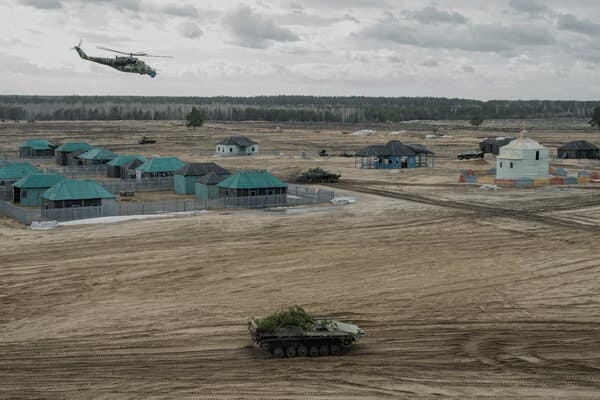The Full Belmonte, 2/20/2022

“Russia’s large-scale military deployment in Belarus, which the United States has long warned could be used as a pretext to build an invasion force aimed at Ukraine, will be extended beyond Sunday when joint exercises had been scheduled to conclude, Belarus’s defense minister announced.
After repeated assurances from Russia and Belarus that the drills would end this weekend as planned, the Belarusian defense minister said on Sunday that the two countries’ militaries would continue to ‘test’ their capabilities because of what they claimed were heightened tensions in eastern Ukraine.
The apparent extension of the exercises — which NATO has said involve 30,000 Russian troops, Moscow’s largest deployment on Belarus territory since the end of the Cold War — put further pressure on Ukraine, which shares a roughly 665-mile border with Belarus that is largely unguarded.
Belarus’s defense minister cited an escalation of violence in eastern Ukraine as the reason for continuing the exercises, although Ukrainian officials say Russia-backed separatists are responsible for the increase in tensions.
On Sunday, separatist leaders suspended a wide range of public activities in the eastern region, known as the Donbas, including ‘leisure, entertainment, entertainment, cultural, exhibition, educational, public and other similar events,’ according to a statement posted on their Telegram channel.
The statement released by the self-proclaimed government in the region offered no evidence that there was a danger to the public.
And it was part of an ominous shift in the long-running conflict in the Donbas, where the Russia-backed rebels in recent days have called for civilians to evacuate to Russia and for residents to take up arms against a possible invasion by Ukraine. Ukraine has denied plans to invade, and Western officials have described the separatists’ claims as lies intended to justify a military intervention by Moscow.
The Belarus defense minister said on Sunday that because of ‘the growing military activity on the external borders of the Union State and the exacerbation of the situation in the Donbas, the presidents of Belarus and Russia have made the decision to continue the inspection of reaction forces.’
The union state, until recently a largely aspirational entity, refers to a merged state comprising Russia and Belarus that was initiated in 1997 but has recently begun to take on a concrete form as Russia has subordinated the Belarusian military and other state structures to its effective command.
The defense minister did not elaborate on what tests would be carried out, or how long they would last. But his remarks indicated Russian troops would not be leaving Belarus, at least not immediately.
As part of the exercises dubbed ‘Allied Resolve,’ which began on Feb. 10, Russia has deployed some of its most advanced and well-equipped forces to nine different bases and airfields around Belarus, according to Russia’s defense ministry. These include highly trained special forces units and airborne troops, together with powerful S-400 antiaircraft systems and hundreds of aircraft, tanks and armored vehicles. Some are stationed within just a few hundred miles of Ukraine’s capital, Kyiv.
The announcement on Sunday appeared to mark a reversal from earlier statements. Belarus’ foreign minister, Vladimir Makei, assured journalists last Wednesday that ‘not a single Russian serviceman and not a single piece of Russian military hardware will remain after these maneuvers.’ Also last week, the Kremlin’s spokesman, Dmitri S. Peskov, said that Russia keeping troops in Belarus after the exercises ‘is not being considered.’
From the time the exercises were announced in January, Western officials have warned that the Kremlin could be using them to deploy forces that could be used in a possible invasion of Ukraine. Last month, Jens Stoltenberg, the NATO secretary general, warned that Russia had in the past Russia used military exercises as a cover for preparing for military action, including before Russian troops seized the Crimean Peninsula in 2014.
‘We’ve seen it many times before, that exercises, high readiness of forces as part of an exercise, is used as a disguise to launch an attack,’ Mr. Stoltenberg said.” Read more at New York Times

Queen Elizabeth this month. Buckingham Palace announced on Sunday that she has been infected by the coronavirus.Credit...Pool photo by Joe Giddens “LONDON — Queen Elizabeth II has been infected with the coronavirus, Buckingham Palace said on Sunday, becoming one of the world’s most prominent figures to battle the virus and deeply rattling the country she has led for seven decades. The palace issued few details about the condition of the queen, who turns 96 in April….
She met this month with her eldest son and heir, Prince Charles, who was reinfected with the coronavirus and went into isolation. He last contracted a mild case of the virus in March 2020, as the pandemic was first engulfing Britain.
Prime Minister Boris Johnson suffered a severe bout of Covid around the same time and ended up in an intensive care unit. But even that alarming episode paled next to the news that the queen, who has reigned for longer than most Britons have been alive, has contracted a potentially deadly disease.
Buckingham Palace has labored to protect the queen from exposure to the virus. She retreated to Windsor Castle in early 2020 with her husband, Prince Philip, and lived in virtual quarantine for more than a year.
Elizabeth received a dose of a coronavirus vaccine in January 2021 at Windsor Castle, along with Philip. The palace has not confirmed any subsequent vaccine doses. Charles has said that he is fully vaccinated and boosted” Read more at
“Hundreds of Canadian police swept through the country's capital Saturday, arresting protesters and clearing out vehicles in an attempt to bring an end to a three-week protest against COVID-19 restrictions.
At least 170 people were arrested Friday and Saturday, after police began the crackdown of the so-called Freedom Convoy on Friday morning. Officers, some in riot gear, approached the protest zone and scuffles broke out in some areas as police, including some officers on horses, pushed the crowd back.
Protesters were gone from the street in front of Parliament Hill by Saturday morning. Police said on Twitter that protesters were ‘aggressive and assaultive’ throughout their attempts to clear the area, and pepper spray was used to disperse them. They also said children had been brought to the front of the police line.” Read more at New York Times
“New Mexico National Guard members were deployed to help schools address pandemic-related staff shortages.” Read more at New York Times
“Computer scientists believe they have identified two men as the likely sources of the QAnon conspiracy theory movement.” Read more at New York Times
“Republicans in Wisconsin are getting behind a fringe scheme: trying to reinstall Donald J. Trump in the White House.” Read more at New York Times
“With eight days until his self-imposed deadline, Biden is expected to name his Supreme Court pick soon.” Read more at New York Times
“Australia reopens to travelers tomorrow.” Read more at New York Times
“PARIS — A modeling agent who was close to disgraced U.S. financier Jeffrey Epstein was found dead Saturday in his French jail cell, where he was being held in an investigation into the rape and sex trafficking of minors, according to the Paris prosecutor's office.
Victims of the alleged abuse described shock and dismay that the 75-year-old agent, Jean-Luc Brunel, will never face trial. They described his death as a double blow, after Epstein killed himself in 2019 in a Manhattan jail while awaiting sex-trafficking charges.
Brunel's lawyers suggested Saturday that he, too, killed himself.” Read more at USA Today
“AT&T is shutting down its 3G network on Tuesday. The move will impact people still using 3G Kindles, 3G flip phones, the iPhone 5 and older models, various Android phones and some wearable devices. It will also affect home alarm systems and medical devices such as fall detectors. Some in-car crash notification and roadside assistance systems like OnStar will also need to be updated or replaced. AT&T owns WarnerMedia, CNN's parent company.” Read more at CNN
“The worst people in the world: Defiant Covid-era customers are ruining flight attendants’ lives.” Read more at New York Times
Moviegoers in Beijing.Ng Han Guan/Associated Press
“The price of admission
Before the Winter Olympics, Chinese officials cautioned athletes against speaking out about topics that cast them in a bad light. Then, House Speaker Nancy Pelosi told American athletes not to anger the Chinese authorities.
It was the latest sign that China’s campaign to stifle dissent is succeeding in an important way: U.S. institutions and businesses are increasingly silencing themselves to avoid angering the Chinese government.
The professional wrestler and actor John Cena apologized, in Mandarin, last year for calling Taiwan a country. In 2019, a Houston Rockets executive apologized for tweeting support for pro-democracy protests in Hong Kong after Chinese officials complained, and a top video game publisher suspended an e-sports competitor who voiced support for the protests. The 2013 movie ‘World War Z’ was rewritten to clarify that its zombie-spawning virus didn’t originate in China.
Erich Schwartzel, the author of ‘Red Carpet,’ which is about China’s relationship with Hollywood, told me that one number drives these decisions: 1.4 billion, China’s population.
American businesses and institutions want access to this enormous market. Given China’s authoritarian leadership, that means playing by the Chinese Communist Party’s rules — and, in particular, avoiding criticism of its human rights abuses. So cultural institutions that are influential bastions of American values like free expression are now frequently absent from public conversations about China.
Compromising values
U.S. sports and media have often showcased American values, even if clumsily or unfairly. These cultural exports helped spread democratic ideas internationally during the Cold War. Movies like ‘Mr. Smith Goes to Washington’ or ‘Selma,’ which celebrate democracy, justice and equality, can change how people view the world and how it works. Celebrities can push people to vote or get vaccinated, or put a spotlight on neglected problems.
Censorship prevents these institutions from shining a light on China as its leaders oppress dissidents, crack down on democracy in Hong Kong, round up and detain ethnic Uyghurs and threaten war with Taiwan.
Asked about business in China in an interview with the Times Opinion writer Kara Swisher, the former Disney C.E.O. Bob Iger acknowledged the reality facing Hollywood: ‘You try in the process not to compromise what I’ll call values. But there are compromises that companies have to make to be global.’
A recent example of censorship appears in ‘Top Gun: Maverick,’ set to premiere in U.S. theaters this year. In the original 1986 movie, Tom Cruise’s character, the U.S. Navy aviator Pete Mitchell, wore a jacket with patches of the Taiwanese and Japanese flags. In the coming sequel, those flags are gone.
As Schwartzel reported, Chinese investors told movie executives that the Taiwanese flag was a problem because China doesn’t consider Taiwan independent. Playing it safe, the executives also removed the Japanese flag because of Japan’s own historical tensions with China.
‘Wolf Warrior 2’ features an American mercenary antagonist.Andy Wong/Associated Press
In the meantime, Chinese studios are getting better at making movies, and they’re not afraid to take an anti-American stance. In 2017’s popular ‘Wolf Warrior 2,’ the Chinese hero Leng Feng saves African villagers from an American mercenary called Big Daddy, who proclaims his people’s supremacy moments before Leng triumphs and kills him.
The consequences are asymmetrical. Chinese movies proudly showcase their country’s values while American movies remain silent about China — skewing the messages people hear not just in the U.S. and China but across the globe.
American movies can even give the impression that China is better. In the 2014 movie ‘Transformers: Age of Extinction,’ U.S. officials were portrayed ‘in unflattering tones,’ according to PEN America. The Chinese characters in the film, which was made with the Chinese government’s support, were more often selfless and heroic. Variety called the movie ‘a splendidly patriotic film, if you happen to be Chinese.’
‘Transformers’ made more than $1 billion at the box office — $300 million of it from China. From a business perspective, it was a success.
A growing problem
The pull of censorship stands to grow as China’s economy, and therefore the potential market for U.S. businesses, also grows.
Some American lawmakers have tried to address the problem, but any change in U.S. policy would most likely have little effect. The same free-speech rights those politicians defend also make it hard for them to tell Hollywood, the N.B.A. or anyone else what to do.
Another issue: The most striking and obvious examples of censorship have involved blatant interventions by Chinese officials. But U.S. businesses are more frequently doing what Yaqiu Wang at Human Rights Watch calls anticipatory self-censorship: ‘Before the idea of a movie is even conceived, the first thing they need to think is, ‘How can I make sure that this movie can be shown in China?’
That kind of self-censorship is harder to detect — or do anything about.
Ultimately, American institutions may have to make their own choice: Reject censorship or maintain access to China. Right now, desire for access is winning.
For more:
China’s censorship efforts are part of attempts to shore up domestic nationalism by Xi Jinping, the country’s top leader.
‘Friends’ is the latest victim of censorship on China’s streaming platforms.
In a rare reversal, the original ending of ‘Fight Club’ was restored after an international backlash.
American academics say they also feel increasing pressure to censor themselves when talking about China.” Read more at New York Times
“The Pittsburgh Steelers hired Brian Flores, who is suing the NFL for racial discrimination, as assistant coach.” Read more at CNN
“Just like that, all 109 medal events at the 2022 Beijing Winter Olympics have been handed out.
On the final day of competition Sunday, cross-country skier Jessie Diggins claimed her second medal of these Games, a silver in the women's 30-kilometer mass start.
Diggins, who also won a bronze earlier these Games in the women's sprint, gave Team USA its 25th overall medal in Beijing.
Earlier in the day, the U.S. Alpine ski team came agonizingly close to a medal of its own, making it through two rounds of the mixed team competition before losing to Germany in the semifinals and Norway in the bronze-medal race.
It marked yet another disappointment for two-time Olympic gold medalist Mikaela Shiffrin, who came to Beijing with the possibility of winning six medals and ended up going home with none.” Read more at USA Today





